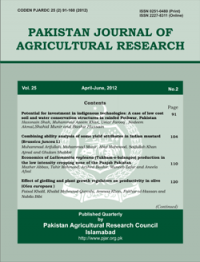EFFECT OF DEFICIT IRRIGATION, SOWING METHODS AND MULCHING ON WHEAT YIELD AND NITROGEN UPTAKE
Abdul Razaq*, Muhammad Jamal Khan*, Tahir Sarwar* and Mohammad Jamal Khan**
ABSTRACT
To determine the irrigation water scarcity, inefficient irrigation supplies to farm lands, increasing temperature with high evaporation rate and poor sowing, an experiment was conducted at the research farm of the University of Agriculture, Peshawar during 2011-12. In the study three factors were studied i.e., sowing methods, mulching and deficit irrigation with four levels viz: full irrigation (DI ), 20% deficit irrigation (DI ), 40% deficit irrigation (DI ) and 60% deficit irrigation (DI ). Soil moisture was continuously monitored and full irrigation was determined on the basis of 50% Management Allowed Deficit (MAD). Results indicated that sowing methods, mulching and various levels of deficit irrigation significantly (P<0.05) affected wheat yield and nitrogen uptake. Raised beds cultivation produced higher number of tillers m (415), grain yield (5.13 t ha ), biological yield (12.02 t ha ) and total nitrogen uptake (141.7 kg ha ) as compared to the traditional flat bed. Similarly, mulch plots resulted in higher tillers m (404) wheat grain yield (4.94 t ha ), biological yield (11.94 t ha ) and total nitrogen uptake (137.6 kg ha ) than flat bed. In deficit irrigation, maximum tillers m (412), wheat yield (5.20 t ha ), biological yield (11.98 t ha ) and total nitrogen uptake (144.7 kg ha ) was recorded at full irrigation application followed by 20% deficit. None of the interactions were found significant.
To share on other social networks, click on any share button. What are these?






